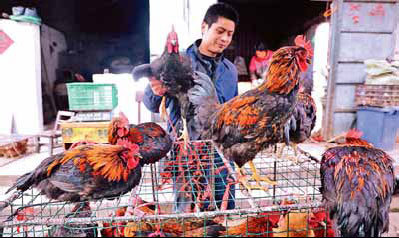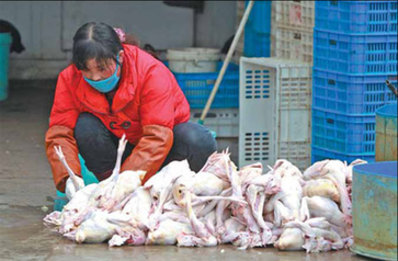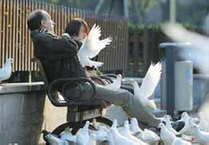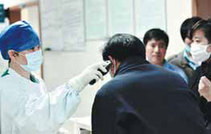Avian flu quiets song in bird market
Updated: 2013-04-08 08:00
By Shan Juan and He Na in Beijing, and Wang Hongyi in Shanghai (China Daily)
|
||||||||
|
Poultry trading slows in Huaibei, Anhui province, amid fears of the H7N9 strain of bird flu. Wan Shanchao / for China Daily |
|
The trade in live poultry has been suspended in the cities of Shanghai, Nanjing and Hangzhou. You You / for China Daily |
Trading of live poultry suspended following deaths, report Shan Juan and He Na in Beijing, and Wang Hongyi in Shanghai.
Few stalls were open on Sunday in Shanghai's Wanshang flower and bird market in the wake of deaths from the H7N9 strain of bird flu. Sunday is usually the busiest day of the week as bird lovers of all ages wander around and listen to the chorus of thousands of birds.
|
A worker cleans his truck after unloading poultry at Zijin shan live poultry market in Nanjing, Jiangsu province. You You / for China Daily |
On April 6, the local government ordered the suspension of all trading in live poultry and pet birds, but so far there has been no official directive to close the market.
In addition to Shanghai, the trade in live poultry has also been suspended in the cities of Nanjing and Hangzhou. Meanwhile, the rest of the country looks on nervously.
Investigations conducted by the Ministry of Agriculture to determine the source of H7N9 have shown that the strain is prevalent at live poultry markets in the affected areas, but so far it has not yet been detected at poultry farms.
The possibility that the virus was brought into the country by migrant birds could not be ruled out so far, said Yu Kangzhen, China's chief veterinarian with the Ministry of Agriculture.
The first death from the strain was reported on March 2. As of Sunday, there were 21 confirmed cases, 12 of them severe and two mild, and six people have died, according to official statistics.
So far, the areas affected are the municipality of Shanghai and the provinces of Zhejiang, Jiangsu, and Anhui.
Most of the infected patients have developed severe pneumonia, according to the World Health Organization, and other symptoms include fever, coughing and shortness of breath.
|
Pigeons at the People's Square in Shanghai. The wild pigeons have been caged and the local authorities have carried out cleaning and sterilization work. Gao Erqiang / China Daily |
"Because the health authorities have ordered nationwide investigations into cases of pneumonia with unknown causes, more cases (of H7N9) are likely to emerge," said Feng Zijian, director of the health emergency center at the Chinese Center for Disease Control and Prevention.
To facilitate the investigations, domestically developed quick-testing kits have been distributed nationwide.
The authorities have asked all health institutions across the country to report suspected and confirmed cases directly to the national health commission within two hours of detection. Details of local conditions have to be reported daily, said Shu Yuelong, director of the Chinese National Influenza Center.
Moreover, a circular from the National Health and Family Planning Commission prohibits hospitals from delaying or denying treatment to H7N9 patients because of financial reasons.
"Suspected cases can be screened within 15 minutes, thanks to the new testing reagents. However, we don't test those patients who only have a fever, because that would waste manpower and resources," said Wang Yan, a respiratory specialist at the fever clinic of the China-Japan Friendship Hospital in Beijing who was also at the forefront of the fight against SARS in 2003.
Based on clinical experience and the patient's symptoms, "we will only ask people that have had contact with poultry, come from an infected area, or have had contact with patients or people who have recently exhibited suspected symptoms, to undergo the test," she said.
According to Shu, a number of routine flu prevention mechanisms were established in the wake of the SARS outbreak. The mechanisms comprise a complete set of testing equipment, methods and emergency plans.
|
A doctor examines a patient at a fever clinic at the No 1 Hospital of Zhejiang University in Hangzhou. Long Wei / Xinhua |
To cope with a potential outbreak, "our hospital has also improved special training for medical staff in the prevention of bird flu and treatment", said Wang.
She advised people with serious flu-like symptoms to consult a doctor as soon as possible, because the first 24 hours after the onset of H7N9 are crucial for effective treatment.
'Sporadic virus'
Beijing resident Wang Shuqing, 58, was on a drip at the fever clinic of the hospital. His wife, Li Shuang, sat on a chair in the corridor, wearing a blue surgical mask and looking anxious.
"We all experienced SARS in 2003. We were frightened by the reports of the deaths from bird flu in some southern provinces, so to avoid cross-infection we treated him at home with antipyretics. However, almost a week has passed and still the medicine hasn't helped to reduce the fever," she said.
"It's my fault. I insisted on treating him at home after he developed the fever. If we had sent him to the hospital earlier, his fever wouldn't have developed into pneumonia. Now he has to suffer more pain. The doctors and nurses are working as normal and there's been no big increase in the number of patients at the fever clinic, as we expected. I think we really overacted this time," she added.
It was later determined that Wang Shuqing had flu, not H7N9.
Nationally, the central government has stepped up vigilance and carried out retrospective and epidemiological studies to combat the disease, said Deng Haihua, a spokesman for the National Health and Family Planning Commission.
So far, no one in close contact with patients with confirmed H7N9 has tested positive for the new virus, he said.
Meanwhile, Michael O'Leary, the World Health Organization's representative in China, added a note of optimism: "Right now we see no risk of human-to-human transmission, and we hope that it will remain the case.
"We have to follow that very closely, however, because the virus can change. But at present, it looks like this is a sporadic virus that people are only catching from animal sources," he said.
H7N9 is primarily related to other avian viruses and the discovery that it has been detected in pigeons provides a clue for those working to locate each patient's source of infection, he noted.
Zhong Nanshan, a renowned medical expert in China, urged greater efforts in tracing the source of the virus. "We should further expand investigations and testing among wild birds as well," he said.
In fact, so far no birds have died from H7N9, even though some have tested positive, according to Bi Yingzuo, a professor who sits on the official poultry-related disease expert panel in southern Guangdong province.
The lack of avian deaths prompted him to suggest that the infection, now widely known as H7N9 bird flu, should be renamed simply as H7N9 flu. "In a similar case, swine flu was renamed H1N1 flu," he said.
Analysis of the virus' genes suggested that, although the strain evolved from avian viruses, they have displayed signs of adaptation to grow in mammalian species.
So far, the virus has prompted a cull of more than 20,000 birds, but has caused no major problems in poultry.
Anger and resentment
"We stopped selling birds on Saturday," said Fan Qi, owner of the Xiao Fan Store at Wanshang flower and bird market. Now, only one bird remains at the store, Fan's own pet. "Nobody wants to buy birds now," she sighed.
Other storekeepers expressed anger at the ban. One seller, in his 40s, raged about the move. "Our birds are totally safe. They were raised in isolation with no contact with the wild birds that are said to carry the virus," he said.
At lunchtime on Sunday, about 20 birds were still visible in individual cages at his store, although the door was half shut to prevent prying eyes. "Why should we close our store? How can we make a living without selling birds?" he asked.
While many salespeople have been badly affected by the strain of bird flu, restaurants are reported to have been affected too.
However KFC, McDonald's and a number of other fast food restaurants in Shanghai that mainly sell chicken, still served a lot of customers on Sunday, most of whom chose to eat chicken and seemed untroubled.
"I've heard the news about bird flu, but I'm not afraid of it. The experts said that there is no harm in eating chicken if it's been cooked at a high temperature," said one KFC customer.
Meanwhile, the Shanghai authorities have ordered the closure of public squares and parks where residents feed wild pigeons. According to the management office of People's Square and Century Park, all the wild pigeons have been caged and the authorities have carried out cleaning and sterilization work.
Shanghai Racing Pigeon Association also announced that it has cancelled all races to avert a potential spread of the virus and Shanghai Zoo said it is stepping up monitoring and sterilization work.
Monitoring in the zoo, especially in the swan lake and bird enclosures, has been strengthened. If dead birds are discovered, they will quickly be sent for tests, according to a zoo official.
Unanswered questions
Despite ongoing efforts such as enhanced virus surveillance, epidemiological studies, and measures to control potential sources of exposure, "there remain some essential facts we don't know yet", said Feng Zijian.
First, how clinically serious is the human infection? So far most reported H7N9 cases have been fatal or severe, but a more general picture - including the proportion of mild and medium cases, in other words, the clinical severity - has not yet fully emerged, and knowledge about the full spectrum of the disease remains limited, he said.
A second unanswered question is how easily can the virus jump from birds to humans?
Third, is a vaccine necessary and if so, how difficult would it be to develop one? While no specific medication for H7N9 is yet available, the WHO said that the virus is vulnerable to some existing flu treatments, including the drugs Oseltamivir and Zanamivir. However, some experts believe that a specific H7N9 treatment could only be developed at the expense of developing vaccines for seasonal flu, according to reports by Reuters.
Meanwhile, the virus has already been isolated and characterized by studies conducted on the initial cases, according to the WHO. The first step in the development of a vaccine would be the selection of candidate viruses upon which a vaccine could be based.
The WHO, in collaboration with its partners, will continue to characterize available H7N9 viruses to identify the best candidate viruses, which could be used for the manufacture of vaccine, if that step becomes necessary.
But it would likely take months, at least, to produce the first doses, said Feng.
Another major question regarding the virus is: which groups are likely to be most susceptible, he added. The National Health and Family Planning Commission has distributed prevention and control plans acknowledging that those at high risk include poultry raisers, sellers, butchers and meat processors.
"More biological information about the high-risk population needs to be known," explained Feng.
However, "we can see that the proportion of vulnerable people remains low", he stressed.
For Zhong Nanshan, the big question is whether the H7N9 virus could cause a pandemic. "Given that reported cases remain limited at the moment it's a little hard to tell where this will go," he said, adding that so far there has been no evidence of person-to-person transmission.
A 2007 study jointly conducted by Columbia University in the US and the Infectious Diseases Center at Peking University found that the H5N1 bird flu virus can pass from pregnant women to their unborn children. A 4-month-old fetus that died along with its mother after she contracted the virus, was also infected, it said.
In addition, the study found that the virus not only affects the lungs, but also passes through the body into the gastrointestinal tract, the brain, liver and blood cells.
Despite the findings, Feng said there is no need to panic, because this type of mother-to-fetus transmission is extremely rare. "That single case alone doesn't demonstrate that the bird flu virus can be transmitted among the human population," he stressed.
However, given that the recent cases of H7N9 are the first ever seen in humans, continual vigilance is essential, he said.
Peng Yining and Wang Qingyun in Beijing and Zhang Xiaoxian in Shanghai contributed to this story.
Contact the writers at shanjuan@chinadaily.com.cn and wanghongyi@chinadaily.com.cn
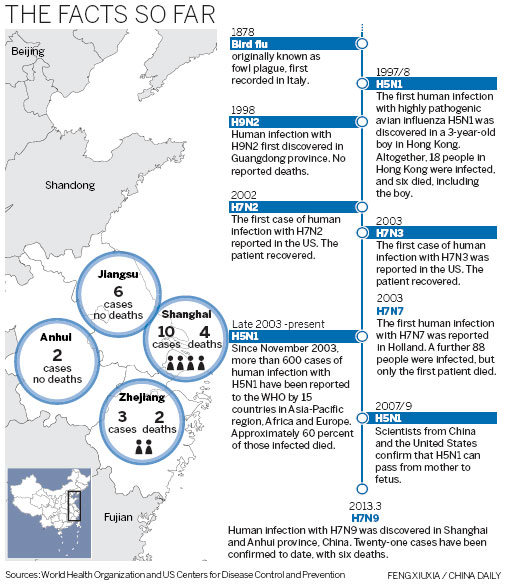
(China Daily 04/08/2013 page6)

 In Photos: 7.0-magnitude quake hits Sichuan
In Photos: 7.0-magnitude quake hits Sichuan
 Li Na on Time cover, makes influential 100 list
Li Na on Time cover, makes influential 100 list
 FBI releases photos of 2 Boston bombings suspects
FBI releases photos of 2 Boston bombings suspects
 World's wackiest hairstyles
World's wackiest hairstyles
 Sandstorms strike Northwest China
Sandstorms strike Northwest China
 Never-seen photos of Madonna on display
Never-seen photos of Madonna on display
 H7N9 outbreak linked to waterfowl migration
H7N9 outbreak linked to waterfowl migration
 Dozens feared dead in Texas plant blast
Dozens feared dead in Texas plant blast
Most Viewed
Editor's Picks

|

|

|

|

|

|
Today's Top News
Live report: 7.0-magnitude quake hits Sichuan, heavy casualties feared
Boston suspect cornered on boat
Cross-talk artist helps to spread the word
'Green' awareness levels drop in Beijing
Palace Museum spruces up
First couple on Time's list of most influential
H7N9 flu transmission studied
Trading channels 'need to broaden'
US Weekly

|

|
